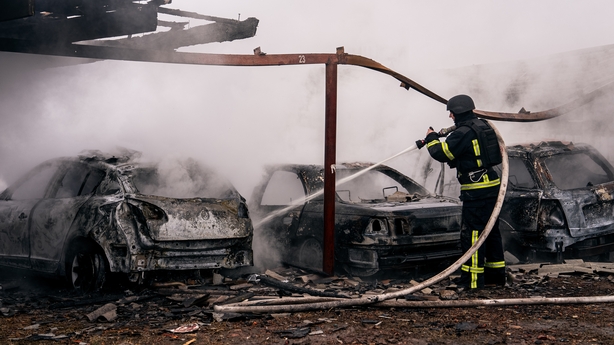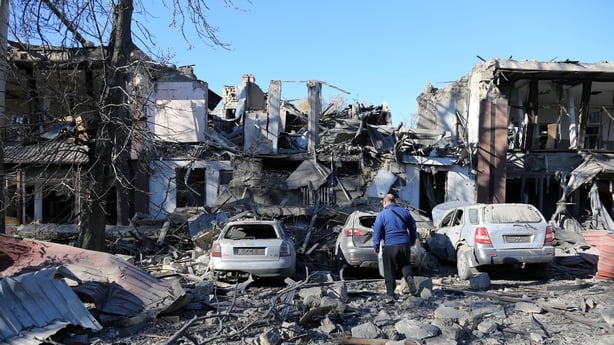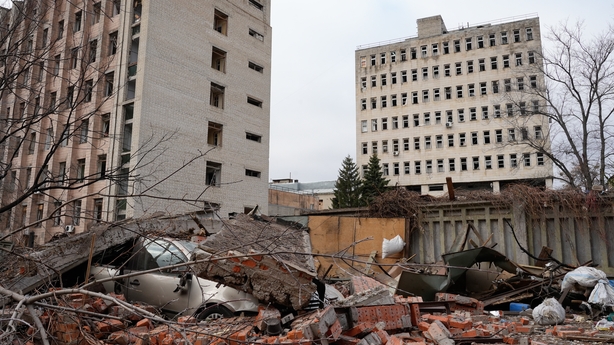Foreign ministers from the Group of Seven democracies have expressed their support for Ukraine and condemned what they described as Russia's "irresponsible and threatening nuclear rhetoric".
They also warned that North Korean support for Russia marked a dangerous expansion of the conflict, with serious consequences for European and Indo-Pacific security, and called on China, along-standing ally of North Korea, to act against it.
"Russia's use of an intermediate range ballistic missile on 21 November is further evidence of its reckless and escalatory behaviour," they said in a draft statement at the conclusion of their meeting.
"Our support for Ukraine's territorial integrity, sovereignty and independence will remain unwavering," they added.
Russia has been making a major push along frontlines in Ukraine's east, where Russian forces have made some of their biggest territorial gains since 2022.

The G7 ministers added that they hoped to start distributing funds from a $50 billion (€47 billion) loan package stemming from frozen Russian assets by the end of the year. They also pledged to act against groups helping Russia to evade sanctions imposed on it after its invasion of Ukraine almost three years ago.
Their joint statement was issued at the end of a two-day meeting in Fiuggi, a spa town southeast of Rome, which Ukrainian Foreign Minister Andrii Sybiha attended.
Ukraine hit Russia with US-produced ATACMS missiles twice over the last three days and Russia is preparing retaliatory measures, Russia's defence ministry has said.
The ministry said both strikes targeted air defence positions in the Kursk region and on both occasions either one or two missiles reached their targets, while most were shot down.
The strikes - on 23 and 25 November - targeted military installations and an airfield, the ministry said on Telegram.
"Retaliatory actions are being prepared," it added.
We need your consent to load this rte-player contentWe use rte-player to manage extra content that can set cookies on your device and collect data about your activity. Please review their details and accept them to load the content.Manage Preferences
It comes as Russia said its troops have captured another village in an area in Ukraine's eastern Kharkiv region where the front line had been relatively stable until recently.
The defence ministry said "military units... have liberated the settlement of Kopanky," a village near the Ukrainian-held city of Kupiansk.
Ukraine's military said it shot down 76 out of a record high of 188 drones launched by Russia.
The air force said it lost track of 96 of the drones, likely due to active electronic warfare, and five drones headed towards Belarus.

Russia's air attacks damaged the power grid in Ternopil, a major city in western Ukraine, cutting off electricity and water, and disrupting heat supplies, the head of the regional defence headquarters said.
Emergency services were working to restore water supply by early morning, Serhiy Nadal, head of the Ternopil Region Defence Council headquarters, said on Telegram, but power disruptions will continue for hours.
Electric buses that service the city will be replaced with regular buses and generators will help with power shortages in schools, hospitals and government institutions, he said.
Mr Nadal did not provide details on the extent of the damage in the city that had a population of nearly of a quarter of a million before Russia's 2022 invasion of Ukraine.
The full scale of the attack was also not immediately clear.
Ternopil, some 220km east of NATO-member Poland, and most of Ukraine were under overnight air raid alert for hours, according to Ukraine's air force data.
Russia also targeted Kyiv, the military administration of the city said on Telegram, adding that Ukraine's air defence units destroyed more than ten Russian drones.
Russian drones approached the capital in waves and from different directions, but there was no damage or injuries as result of the attack, Serhiy Popko, head of Ukraine's military administrations.
On the battlefield, Ukraine's fatigued troops are struggling to halt advances by Russian forces in the east of the country.

Russia advances at fastest monthly pace since start of war - analysts
The war is entering what some Russian and western officials say could be its most dangerous phase after Russia's forces made some of their biggest territorial gains in recent months.
"Russia has set new weekly and monthly records for the size of the occupied territory in Ukraine," independent Russian newsgroup Agentstvo said in a report.
The Russian army captured almost 235sq/km in Ukraine over the past week, a weekly record for 2024, it said.
Russian forces had taken 600sq/km in November, it added, citing data from DeepState, a group with close links to the Ukrainian army that studies combat footage and provides frontline maps.
Russia began advancing faster in eastern Ukraine in July just as Ukrainian forces carved out a sliver of its western region of Kursk.
Since then, the Russian advance has accelerated, according to open source maps.
Russia's forces are moving into the town of Kurakhove, a stepping stone towards the logistical hub of Pokrovsk in Donetsk, and have been exploiting the vulnerabilities of Ukraine's troops along the frontline, analysts said.
"Russian forces recently have been advancing at a significantly quicker rate than they did in the entirety of 2023," analysts at the Washington-based Institute for the Study of War said in a report.
The General Staff of Ukraine's armed forces said in its update that 45 battles of varying intensity were raging along the Kurakhove part of the frontline.
The Institute for the Study of War report and pro-Russian military bloggers say Russian troops are in Kurakhove.
NATO and Ukraine to hold talks over experimental Russian missile
Meanwhile, ambassadors from Ukraine and NATO's 32 members will meet in Brussels over Russia's firing of an experimental hypersonic intermediate-range missile last week.
Russia carried out a strike last Thursday on the Ukrainian city of Dnipro which president Vladimir Putin said was a test of its new Oreshnik missile.
He warned that Russia felt "entitled" to hit military facilities in countries that allow Ukraine to use their weapons against Russia.
Ukrainian President Volodymyr Zelensky called the strike "the latest bout of Russian madness" and appealed for updated air-defence systems to meet the new threat.
Ukraine said it hopes to get "concrete and meaningful outcomes" after calling the meeting of the NATO-Ukraine Council.
But diplomats and officials at NATO have played down expectations for any major results from the consultations.
The most that is expected is a reiteration of NATO's earlier insistence that Russia's deployment of the new weaponry will not "deter NATO allies from supporting Ukraine".
The meeting "provides an opportunity to discuss the current security situation in Ukraine and will include briefings from Ukrainian officials via video link," a NATO official said.
The escalating tensions over Ukraine come as questions hang over the future of western support following the re-election of Donald Trump.
Mr Trump has cast doubt on maintaining the US's military aid for Ukraine and pledged a quick deal to end the war.
NATO and Ukraine established the joint council in 2023 that allows Ukraine to call meetings with the alliance when it sees fit.

